UW’s First Endowed Buddhist Studies Professor
Written by: Elizabeth Fitterer
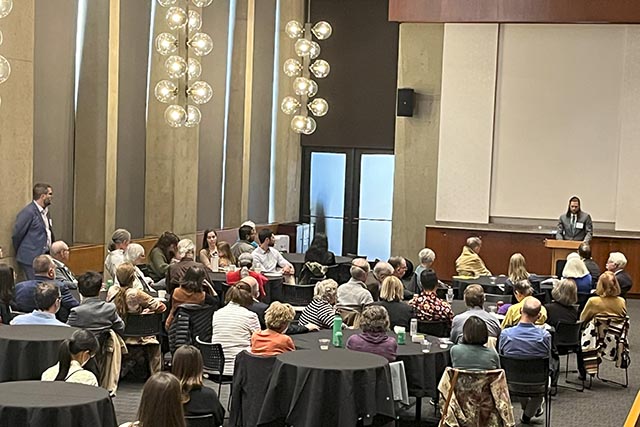
Assistant Professor Joseph Marino, first endowed Buddhist professorship, speaks at the September 29 event at Kane Hall.
Photos by: Belle Arkham, Elizabeth Fitterer, Cris Cyders and Melissa Upton
This fall the University of Washington Buddhist Studies program celebrated a major milestone: the establishment of the Cris and Melissa Upton Cyders Endowed Professorship in Buddhist Studies. This is the university’s first endowed professorship in Buddhist Studies.
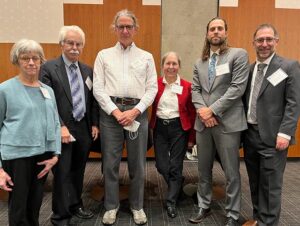
Funds from the endowed professorship will be held and invested by UW, and will be available to support the research and teaching of the UW Buddhist Studies program for years to come.
The inaugural recipient of the professorship is Assistant Professor Joseph Marino. Marino earned a master’s degree in religious studies from Ohio State University in 2007. He then came to UW to focus on Sanskrit and early Buddhism, earning an MA in comparative religion in 2012, and a doctorate in Buddhist studies in 2017. He became a full-time lecturer of Sanskrit at UW in 2019, and was appointed an assistant professor of Buddhist Studies in 2020.
Speaking at a Sept. 29 celebration in Seattle, Marino described himself as “a very lucky person trained by the right people at the right time.”
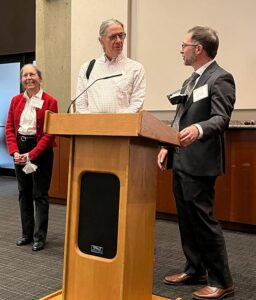
He spoke of the endowment as a signal to prospective students that UW considers Buddhist Studies to be essential, and that it will continue to invest in its humanities programs. He called the UW Buddhist Studies program a place where students can “ask good questions and seek good answers, hopefully for the rest of their lives.”
The ceremony to celebrate the endowment was held in the Walker Ames Room in Kane Hall, with 60 supporters of the UW Buddhist Studies program attending .
Speakers at the event honored endowment donors Melissa Upton and Cris Cyders, for their longstanding support of the UW Buddhist Studies program, and for their commitment to humanities education.
The couple became financial supporters of the UW Buddhist Studies program in 2003, with the 2023 endowment marking a new milestone in their 20-year support.
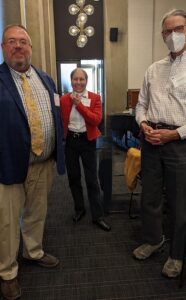
Cyders spoke of his hope that the endowment will be a “dharma door,” which will kindle interest in Buddhist studies among many students.
Upton and Cyders have deep friendships with teachers and practitioners from various Buddhist traditions, and appreciate the various languages and cultures through which UW students can learn about Buddhism. Cyders, who holds a master’s degree from the Institute of Buddhist Studies in Berkeley, came to Seattle in 2002 with Upton, a physician at UW Medical Center.
Professor Emeritus Collett Cox spoke at the September 29 event about Cyders’ compassionate and eloquent presence, as a student in her 2003 Buddhist literature class.
Upton, an undergraduate history major and professor emeritus of Laboratory Medicine and Pathology at UW, shared her deep interest in linguistics as part of culture. She said she hopes the endowment will support “open-hearted, joyful inquiry” into Buddhist studies and the humanities for years to come.
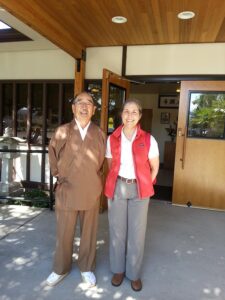
Professor Zev Handel, chair of the UW Asian Languages and Literature Department, spoke at the Sept. 29 event about two developments that secured the future of a robust UW Buddhist Studies program: the appointment of Marino as assistant professor of Buddhist studies in 2020; and the establishment of Marino as the holder of the Upton Cyders Endowed Professorship in 2023.
Professor Emeritus Richard Salomon spoke at the event about UW’s long history of Sanskrit and Buddhist scholarship.
A UW class on Buddhist history was taught in 1910 by Herbert Gowen, an Episcopal rector who was well-versed in many languages, including Sanskrit. In later years UW hired three Buddhist scholars—Leon Hurvitz (1959-1971); Edward Conze (1965-1968); and David Seyfort Ruegg (1972-1983),—whose focus was mainly on Mahāyāna Buddhism.
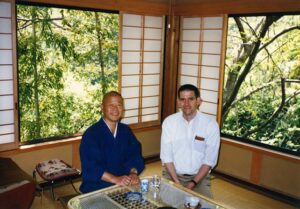
Sanskrit scholar Richard Salomon first taught at UW in 1977, and was hired as a professor in 1981. With the hiring of Abhidharma scholar Collett Cox in 1985, the Asian Languages and Literature Department’s Buddhist Studies program broadened its focus to include more areas of Buddhism. Beginning in the mid-1980s, Cox and Salomon collaborated to strengthen a UW Buddhist Studies curriculum that united Buddhism and Sanskrit.”
Since the mid-1990s, major discoveries have changed the field of Buddhist studies. Hundreds of fragments of ancient Buddhist manuscripts were found in Afghanistan and Pakistan, and were brought to the attention of art collectors and academics.
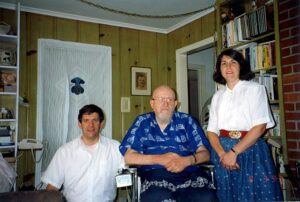
These manuscripts, preserved for thousands of years on birch bark, are the oldest physical Buddhist texts yet to be discovered; the oldest of the fragments may date to the first century BCE. Covering a range of topics, the manuscripts are a rich window into early Indian Buddhism.
Cox and Salomon, along with a generation of doctoral students including Marino, in 1995 started working to study and decipher a portion of these manuscripts held by the British Library. The UW Early Buddhist Manuscripts Project was launched in 1996.
Marino said the vast majority of the manuscript fragments have yet to be studied. The endowment will help to support publication of his book about four Buddhist sūtras found in the manuscript fragments. It will also help support scholarly gatherings and student research, and will fund further efforts in digital publishing of the manuscripts, allowing scholars from all over the world to access the original ancient manuscripts online.
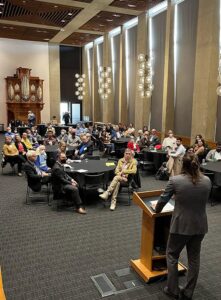
The endowed professorship is revitalizing Buddhist studies at UW at a critical time. In the late 2010s the UW Buddhist Studies program went through a time of uncertainty and transition, with Cox and Salomon about to retire from their longtime teaching posts. In addition, humanities departments at universities across the country were going through a period of reduced enrollment.
In 2017, the percentage of English, philosophy, history, and language degrees conferred at American universities dipped to 4 percent of all degrees, the lowest number ever recorded by the Department of Education.
Turning to the future, Handel referred to the endowment as a gift that will “usher in a new era in a longtime tradition of Buddhist Studies research.”
UW welcomes those interested in Buddhist history, literature, and languages to its Buddhist studies and Sanskrit classes. In addition, the UW Access Program allows Washington State residents aged 60 and over to audit UW classes for a nominal fee. Those interested in attending classes are welcome to explore the UW course catalog and contact course instructors.
Elizabeth Fitterer lives in the Seattle area. She earned a master’s degree in Buddhist studies at the University of Washington in 2023, and was the first recipient of the Khyentse-Husky Fellowship in Buddhist studies.
